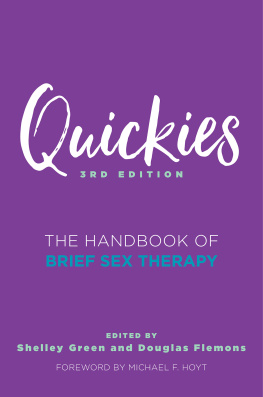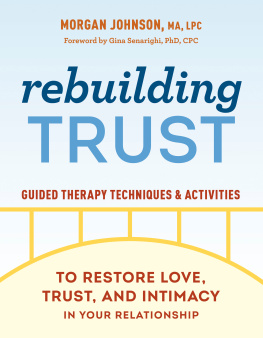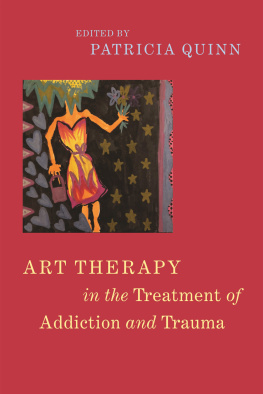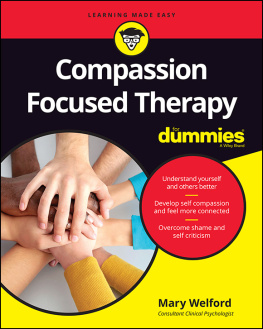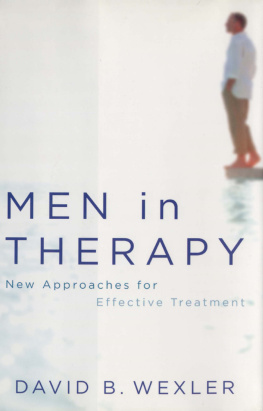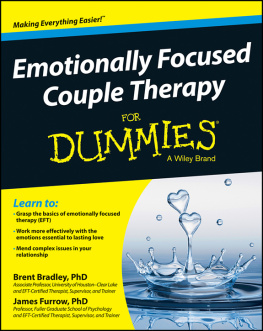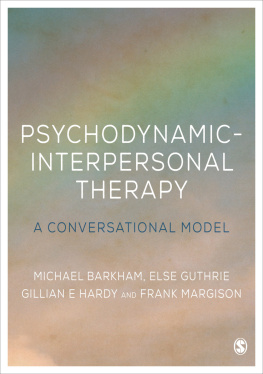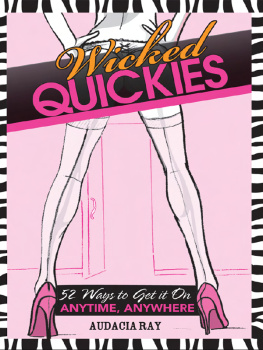
W E WOULDNT HAVE a book if it werent for our amazing contributors. We are delighted to be able to showcase their passion for their clinical work, their creativity and collaborative sensibility, and their generous dedication to helping others become better therapists.
Our students encouraged and challenged us with their curiosities and questions, and a few in particular helped us with specific resources. Cynthia Penalva, Carlos Ramos, Nicole Gordon, Devon Dunn, and Alexander Palmer found relevant articles and/or transcribed some of our talks, portions of which made their way into our new chapter.
Drs. Martha Laughlin and Kate Warner recently invited us to speak about our work to their students at Valdosta State University, and this forum inspired us to bring clearer focus to some developing ideas on working with couples.
Deborah Malmud, Mariah Eppes, and Elizabeth Baird, all at W. W. Norton, were encouraging, patient, and committed to excellence.
Finally, our family, friends, and dogs provided balance and distractions, ensuring that we never took ourselves or our work too seriously.
I WAS QUITE MOVED by Douglas Flemonss and Shelley Greens decision to dedicate this book to the memory of Gary Sanders. Having known him for over 30 years and having shared the same daily workspace with him for the last 20 of these (Tomm, 2003), I am very confident that he would have felt deeply honored and extremely grateful. Gary was a dedicated clinician: a psychologist, a psychiatrist, a sex therapist, a couples therapist, and a family therapist. He was also an academic scholar and an extremely talented teacher who loved educating medical students, colleagues, clients, and others about sexuality. Throughout his career he actively participated in generating the kinds of therapeutic quickies described here, and he would have been delighted to read this wonderful collection of chapters.
Quickies clearly reflects the respectful and resource-oriented values that Gary held so strongly. The authors clarify and creatively apply many of the clinical ideas and methods he used and taught (Sanders, 1995). Indeed, the whole book is a wonderful acknowledgment of what Gary, with all his characteristic passion, lived and worked for. I can easily imagine him smiling, chuckling, bursting out laughing, and occasionally even exclaiming yes! yes!, as he read these pages!
Many years ago when Gary talked and wrote about the Five Sexy Words (volition, mutuality, arousal, vulnerability, and trust) to define best sex, he was already striving toward a second-order perspective that clearly gave the experience of sexual intimacy priority over sexual activity (Sanders, 1991). He often used a strategic question to help his clients recognize and acknowledge the importance of this: If for some reason you could have only one aspect of sex in your life, intimacy or intercourse, but not both, which would you prefer? His focus on sexual experience rather than sexual behavior enabled him to easily bridge the domains of homosexuality and heterosexuality, and to respectfully validate a wide range of human sexual experiences and events (Sanders, 1993).
One particularly empowering aspect of his work, especially with adolescents, was to give permission for freedom of thought and feeling, while opening space for them to choose to act or to not act upon those thoughts and feelings. He found that simply giving permission, within a cultural context of prohibition and judgment, was incredibly healing. He told many stories of so-called sexual deviance that melted away as clients were liberated to imagine freely, to understand what was most important for them experientially, and to choose freely to not act on certain thoughts. Indeed, some of the most bizarre fetishes in teenagers and young adults simply dissolved and evaporated as they internalized ramifications and consequences without duress (Sanders, 1996). With committed couples he was often fond of saying, It doesnt matter where you stimulate your appetite, as long as you eat at home. And for them, he added love and commitment to his five sexy words.
Gary was acutely sensitive to the important issue of the abuse of power in the relationships and experiences of clients (Sanders, 1988). He thought of sexual assault as an oxymoron. For him, any imposition or abuse was out-and-out violence, and had nothing to do with sexuality. He often used a baseball analogy to clarify this, pointing out that sexual assault has no more to do with sex than smashing someones head with a baseball bat has to do with baseball (Liske, 1993). Usually he embellished the analogy quite a bit to make it incredulous and shocking for the listener. I have certainly learnt from him that clearly separating the notions of sex and sexuality from any experiences of abuse is extremely liberating for clients who have suffered not only from the abuse but also from a debilitating conflation of the incompatible experiences of sex and violence (Sanders, 1990). Gary was unusually gifted in his ability to tease these sensitive issues apart, and did so with a marvelous combination of humor and respect.
Yet, despite his extraordinary clinical skills, I suspect Gary would readily agree that there is much that even he could learn from the chapters in this book. There is a certain rigor herein the conceptualization and implementation of systemic, solution-focused brief therapy, and narrative ideas and interventionsthat makes one sense a significant maturation in social constructionist and second-order systemic approaches to therapy. Indeed, I consider it quite an achievement to successfully apply these new and innovative therapy methods so effectively in the domain of human sexuality. Thus, I happily join Gary in applauding the sensitivity, thoughtfulness, and creativity of all the contributions in this fine volume.
Karl Tomm, MD, LMCC, FRCP(C), CRCP(C)
REFERENCES
Liske, C. (1993). Gary Sanders on sexuality and loving intimacy. The Calgary Participator, 3(1), 2231.
Sanders, G. (1988). An invitation to escape sexual tyranny. The Journal of Strategic and Systemic Therapies, 7(3), 2335.
Sanders, G. (1990). Violence, sex, and therapeutic healing. The Calgary Participator, 1(1), 17.
Sanders, G. (1991). Five sexy words. The Calgary Participator, 1(3), 3334.
Sanders, G. (1993). The love that dares not speak its name: From secrecy to openness in gay and lesbian affiliations. In E. Imber-Black (Ed.), Secrets in families and family therapy (pp. 215242). New York: Guilford Press.
Sanders, G. (1995). Sexuality, power, and empowerment: One mans reflections on sex therapy. The Canadian Journal of Human Sexuality, 4, 289298.
Sanders, G. (1996). Recovering from paraphilia: An adolescents journey from despair to hope. Journal of Child & Youth Care, 11(1), 112.
Tomm, K. (2003). Acknowledging the work of Gary Sanders. AFTA Newsletter, 87, 2526.
(A complete listing of Dr. Sanderss publications is available on the University of Calgary Family Therapy Program website: www.familytherapy.org)
Michael F. Hoyt, PhD
I RECALL ATTENDING a human sexuality conference at which one of the participants summarized the day by saying, Sex is between your legs; gender is between your ears; and sexuality is between the sheets! Indeed, in the realm of sexual experience, fire and desire, there is a lot that can get problematicthe moving parts arent just physical; they involve attitudes, beliefs, and transactions, all situated in larger sociocultural contexts. Making sense of whats happeninghow bodies and minds come together (or dont)can be perplexing for both clients and clinicians.
Next page
